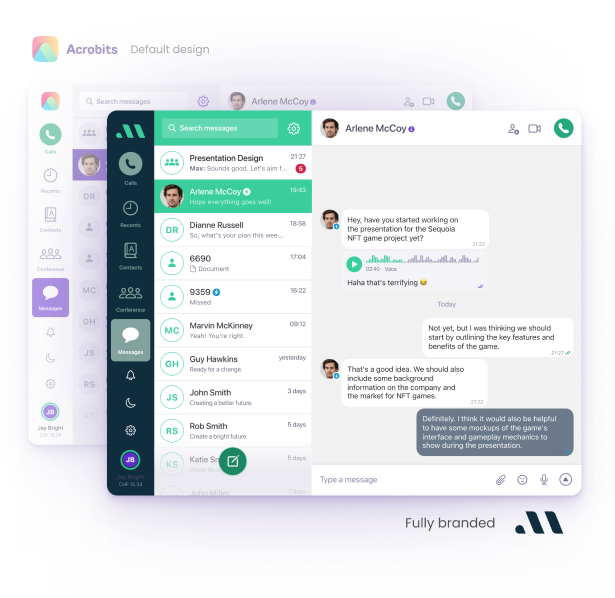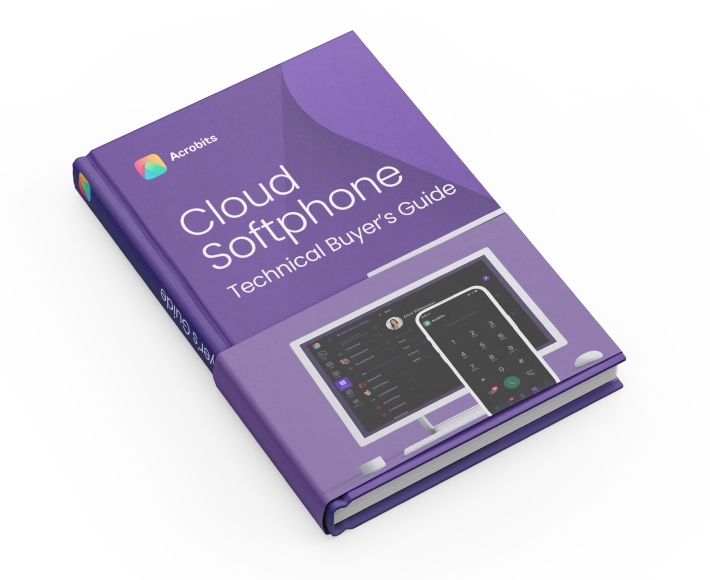
Build a white label softphone app
Create a custom white-label softphone with Cloud Softphone.
- No devs needed
- Native desktop apps
- 100+ premium features

Legacy PBX is on its last legs. Not only are traditional landlines a nightmare to scale, they’re also costly and complicated to manage. But is Voice-over-IP(VoIP) really such a compelling alternative?
To put it another way: Is VoIP reliable enough for business use?
Contrary to what some vendors might tell you, the answer’s yes. Unfortunately, many people still hold onto early VoIP issues, unaware of the ways technological advances have resolved the majority of reliability concerns.
Today, we’re going to talk about those advances — and in the process, bust some of the most common myths surrounding VoIP reliability.
If you’ve done any reading on the topic of VoIP reliability, you’ve probably noticed something unfortunate — way too many of the people writing about VoIP are just phoning it in. They base their discourse on either outdated perceptions or complete misconceptions.
They don’t bother to back any of their claims, instead assuming whoever they’ve decided to copy knows what they’re talking about.
This tendency to parrot the words and claims of others is exactly why there are so many persistent myths about VoIP technology. We’re going to do things a bit differently. To clear up the many myths about VoIP reliability, we’ll substantiate each claim we make.
Let’s get started.
There’s another reason the myths on this list have endured for as long as they have — because in most cases, there’s a grain of truth to each of them.
When VoIP technology was first developed back in 1995, the business world looked very different. Networking technology at the time wasn’t really built to support telephony, and it showed.
Although older networks were able to support voice calls to an extent, they suffered from significant jitter and packet loss. The problem only grew worse during periods of high network congestion. As a result, VoIP gained a reputation for being unstable and unreliable.
So what changed?
First and foremost, networking technology has evolved in leaps and bounds since the early days of VoIP. In 2000, for instance, the global average connection speed was 100 kbps. Today, the global average is around 100 mbps — a 99,900% increase over 2000.

Networks haven’t just gotten faster, either. Hardware improvements have also made them a great deal more reliable. This is because modern business networks must not only support traditional desktops and mobile devices, but all manner of connected endpoints, as well.
There’s also intelligent QoS, which automatically reroutes network traffic to maximize quality, reliability, and stability. These systems can be configured to prioritize VoIP traffic, ensuring packets reach their destination even on congested networks. Lastly, there are several steps businesses can take to enhance VoIP reliability, including:
Our second misconception is closely related to the first — because again, back at the time VoIP technology was first conceived, landline connections were more reliable.
Legacy PBX systems didn’t need to concern themselves with any of the roadblocks or challenges encountered by VoIP solutions. They didn’t require an Internet connection, nor were they reliant on low-bandwidth infrastructure.
Another common refrain about VoIP involves performance during power outages. While landline phones and mobile devices can still function while the power is out, VoIP supposedly cannot. While this may have once been true, it’s no longer the case.
As early as 2014, VoIP systems were increasingly regarded as an effective replacement for landlines, and the technology has only grown more sophisticated since then.
Today, VoIP either matches or exceeds traditional landline performance in most business environments. VoIP also outperforms traditional landlines during localized outages, owing to better business continuity options.
When a landline goes down, there’s not a great deal you can do aside from wait for service to be restored. A VoIP system, on the other hand, can simply failover to a secondary network in the event of an outage. The infrastructure’s simply more robust — especially given how the POTs reached end-of-life two years ago.
It’s only a matter of time before landlines are rendered obsolete, replaced entirely by mobile networks and digital phone systems. Coincidentally, VoIP applications can make calls through mobile networks. With 5G connectivity, they can be every bit as reliable as any other phone system, if not more-so.
And while VoIP connectivity is still affected by jitter, traffic, and throughput, a communication network with the right QoS functionality can all but eliminate these concerns.
A study published in the Journal of Engineering Research and Reports, for instance, saw a purpose-built network outperform a traditional network by 30% when using VoIP.
As far as reliability during power outages is concerned, cloud-based VoIP and softphone applications are accessible from any device, including smartphones — as long as you’ve got access to a mobile network, you’ve got access to VoIP.
Early VoIP systems provided noticeably poorer voice quality compared to alternatives such as landline phones due to networking issues like jitter and packet loss.
Since we’ve already explained how networking technology has evolved, we won’t repeat ourselves. Instead, we’re going to focus on how a recent crisis changed the way the world communicates — and the impact it had on VoIP technology.
Leave early VoIP issues behind. Acrobits leverage recent technological advancements to provide superior call quality. Ready to hear the difference? Start your free trial.

Create a custom white-label softphone with Cloud Softphone.
Many of the reliability, quality, and connectivity issues surrounding early VoIP technology were due to networks at the time not being built to support telephony. Technology has evolved a great deal since then. And one of the most significant drivers of this evolution was COVID-19.
In just the first few months of the pandemic, both VoIP and videoconferencing saw usage rates spike by over 200%. Both technologies proved more or less essential to business communication during lockdown. Consequently, the global VoIP services market is expected to reach US $354.7 billion by 2032.
What does any of this have to do with call quality, exactly? Simply put, if VoIP calls were of noticeably worse quality than alternative communication channels, VoIP adoption would have ground to a standstill once quarantine ended. Instead, the market has continued its upward trajectory.
There’s rarely any noticeable difference in quality between landlines, smartphones, and VoIP connections. What’s more, VoIP offers a ton of features which are unavailable on traditional PBX systems, such as auto attendants and multimedia sharing.
VoIP software is also compatible with newer smartphones and headsets, both of which tend to provide better-quality sound than older phone systems.
The development of VoIP codecs with higher bitrates and more complex algorithms even further enhances call quality.
Older VoIP systems typically required the help of a telecommunications expert to install and configure. But this was hardly unique to VoIP. Most older business technology was complicated to deploy and cumbersome to maintain, including PBX.

This changed due to a combination of smartphones and software-as-a-service (SaaS) applications. Whereas businesses used to be able to tightly control the technologies in their ecosystems, they were now seeing consumer devices and software entering the workplace. This trend, known as the consumerization of IT, impacted all areas of business technology, including telecommunications.
Employees would no longer tolerate complicated systems with poor usability. If they grew frustrated with a business application, they could very easily find a third-party alternative. This necessitated a change in how business systems were designed — including VoIP.
Modern VoIP software is designed for ease-of-use.
Rather than having to undergo a complicated setup process, a business just needs to purchase the necessary licenses. Configuration, if necessary, can be done entirely through an intuitive administration portal. Deskphones, meanwhile, can be bought pre-configured — meaning all the business has to do is plug them in and they’re good to go.
Related Read:
People tend to overestimate just how much bandwidth is required for a voice call. This is another assumption based in the past, however. Back when VoIP was first developed, it did require high speed Internet. But what constituted high speed Internet back then isn’t even close to average today.
This one’s easy enough to bust. All we need to do is circle back to a figure we mentioned earlier. Namely, the average global network speed of 100 mbps. A VoIP connection requires only 100 kbps of bandwidth.
For context, standard definition Netflix requires roughly 2.2 mbps, while a video call via an app such as Zoom requires 1 mbps.
This means theoretically, if you weren’t using the network for anything else, you could host several hundred concurrent calls without seeing a drop in quality or reliability.
It’s easy to see why one might assume VoIP isn’t as secure as a phone operating on the Public Switched Telephone Network. VoIP systems have to contend with the same threat landscape as any software. A legacy PBX phone, on the other hand, can’t really be targeted by a cyberattack.
Don’t assume it’s more secure because of this, though — phones on the PSTN must contend with their own security concerns.
Let’s get one thing out of the way right out the gate: No system is 100% secure. There will always be something a threat actor can exploit. The best anyone can do is take steps to reduce the damage a criminal can do.
VoIP systems actually do an excellent job of this. In addition to encryption protocols like SRTP, the majority of VoIP providers offer features such as multi-factor authentication, advanced call monitoring, and logging. Many of them are also fully compliant with regulations such as PCI, SOC-2, and HIPAA.
Landlines, meanwhile? They aren’t as secure as you might think. The PSTN is vulnerable to both wiretapping devices and radio scanners.
And unlike with VoIP, there’s no way of mitigating those risks. Sure, it’s not exactly likely someone will attempt to hijack your office phone system. But if someone does, there’ll be nothing you can really do to stop them.
There are plenty of misconceptions floating around about the reliability of VoIP systems, most of them based on an outmoded understanding of the technology. Many of the myths we talked about today were true at one time or another. With how much has changed, those days might as well have taken place in a completely different world.
Technology’s gotten more sophisticated. VoIP has become more reliable, functional, and feature-rich. And the PSTN is moving ever closer to its end.
There are plenty of reasons to use VoIP beyond the planned obsolescence of the PSTN, of course. It offers greater flexibility and agility, it’s easier to scale, and it’s one of the most cost-effective ways to keep your people in touch no matter where they are. Best of all, it’s only going to continue evolving in the coming years.
Looking to get started with VoIP? Acrobits is the leading provider of customizable, cross-device softphone apps backed by a robust and reliable infrastructure. Contact us today to learn more about what Acrobits brings to your business.

Create a custom white-label softphone with Cloud Softphone.

TLDR Audience What to focus on Business leaders Business leaders: Treat voice like a product, not a utility. Fund verified identity, branded calling, and in-call AI that moves AHT, FCR, and answer-rate. Engineers Build SIP and WebRTC stacks with analytics APIs, fraud and identity checkpoints, and edge AI in mind. SIP + AI is one […]

The history of VoIP is full of clever hacks. Solutions that started as stopgaps, even kludges, often ended up becoming the standard way of doing things. One of the best examples is push notifications for incoming calls on softphones. What began as a workaround has become the only accepted method on mobile platforms. And Acrobits […]

Android’s greatest strength, its openness and vast device diversity, has also created its most persistent challenge for developers: fragmentation. While Apple’s iOS universe is carefully curated, Android is free to roam across more than 20,000 device types. This means every launch is met by confronting a maze of device-specific quirks, platform evolutions, and new compliance […]

The Customer Acquisition Challenge In today’s digital marketplace, ESIM providers face an increasingly difficult challenge when it comes to customer acquisition. As the industry matures, competition for keywords in digital advertising has intensified dramatically, resulting in higher customer acquisition costs across the board. Major players and emerging startups alike find themselves trapped in bidding wars […]